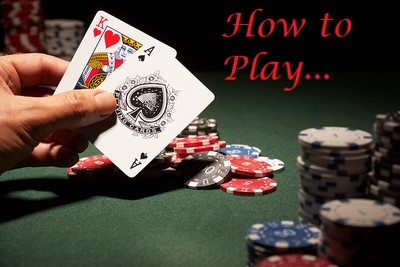 Although no one can agree on exactly when and where the game of blackjack truly originated, the most widely accepted theory is that it came from France around 1700.
Although no one can agree on exactly when and where the game of blackjack truly originated, the most widely accepted theory is that it came from France around 1700.
Its origins aren’t of any real consequence though, and the game as we know it today has been played the same way for centuries now, albeit with new inventive side bets and game variations cropping up along the way.
It’s a card game played against a dealer, and the aim of the game is for your hand to beat the dealer’s. To do that you need your total score to be closer to 21 than theirs without going over. Going over 21 results in a bust and the dealer wins.
When summed up like that it sounds incredibly simple, and it is in a way, but what makes blackjack so popular is the ability for savvy players to play tactically and improve their chances of winning. This is still a game of chance, but your fate is not completely up to the Gods.
The Basics
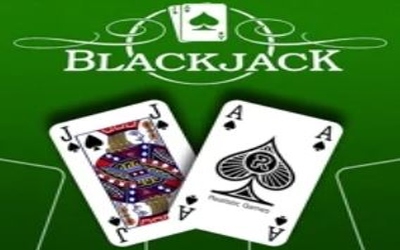 There is a lot to talk about with blackjack, but you won’ get very far unless you have a solid foundation and understand the basics, so let’s break the game down a little as a starting point and then run through an example hand to let the information bed in.
There is a lot to talk about with blackjack, but you won’ get very far unless you have a solid foundation and understand the basics, so let’s break the game down a little as a starting point and then run through an example hand to let the information bed in.
Blackjack starts with your bet. You place your bet before anything else happens. If you are playing in real life you will have to wait for all other players to place their bets too as they will all be playing against the same dealer hand; if playing online you can go at your own pace. Remember, the aim here is to get at close to 21 as possible without going over.
Once all bets are made you will be dealt two cards and so will the dealer, you will be able to see both of your cards but only one of the dealer’s. Once the cards are dealt you will have two basic options: to stand (keep your cards as they are) or to hit (take an extra card). You can hit more than once but if you go over 21 (bust) you lose the game.
Once you are happy with your hand the dealer will complete their hand and providing neither of you have bust the hand with the highest value wins. If you have hands of equal value it is a ‘push’ and your stake is returned.
That’s the game in its simplest form. There are other options available to you but we will cover those separately later on – for now, let’s run through an example hand.
Example Blackjack Hand
Online blackjack tables look much the same as real life ones, so wherever you play you will be looking at something similar to this:
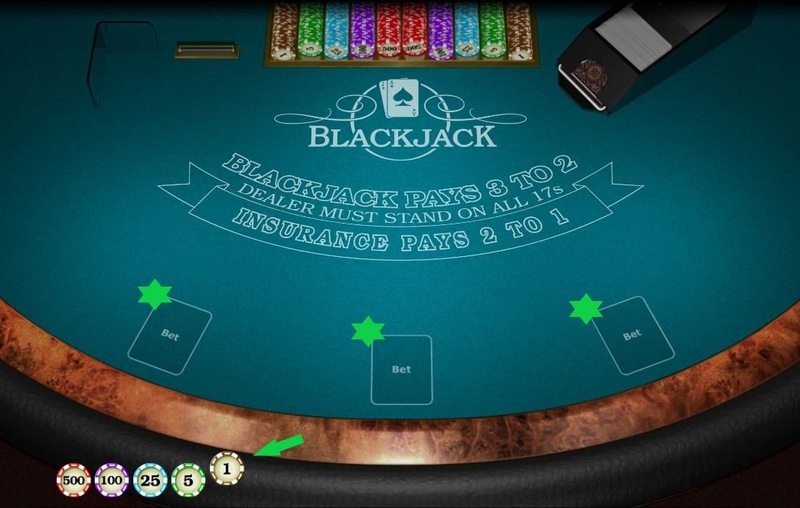
This is the simplest version of a blackjack table that you will find. It has the basic rules written in the middle of the board, the shoe of cards and the dealer’s space, and then three betting areas for the player which we have marked with green stars.
The only other thing to be aware of are the various chip values, marked with a green arrow. At the moment, the chip with a value of £1 is selected which is why it is slightly raised – that means any bet you place will be worth £1, but if you wanted to bet more you could either place several £1 chips or select a larger chip value before placing your bet.
In a real casino the betting areas would be taken up by different people sitting at the table, but online the player can use all of them if they want to, although of course this means you will be betting 3 times as much per round.
We will go ahead and place a £1 bet on a single hand.

You can see our £1 chip is now on the table and we have a few new options:
- Deal
- Double
- Undo
- Clear All
The first two are game options; you can either start the game by hitting deal or double your stake by hitting double.
The second two are to do with table management; undo will remove the last chip you placed, whereas clear all will remove all chips from the table.
We are happy with our bet so we will hit deal and see which cards we get.

We have been dealt a 9 of spades and a 7 of diamonds, so our hand is worth 16. This is where the game gets interesting.
If happy with that number we can stand (also called hold) and if we would like to get closer to 21 we can hit. Remember though, if we hit and go over 21 we bust and lose the game.
The dealer has a 7, but we will not find out what their other card is until we have finished our hand, so we need to think about the possibilities based on the cards that could come out next.
We know the dealer has to stand on 17 (it’s written in the middle of the table) and there are a lot of cards in the shoe worth 10, they will also keep drawing cards until they get to 16 so our only hope is to hit and get a better score or cross our fingers and hope the dealer busts.
Basic strategy tells us that we should always hit on 16 if the dealer’s up card is a 7, so that is what we will do.
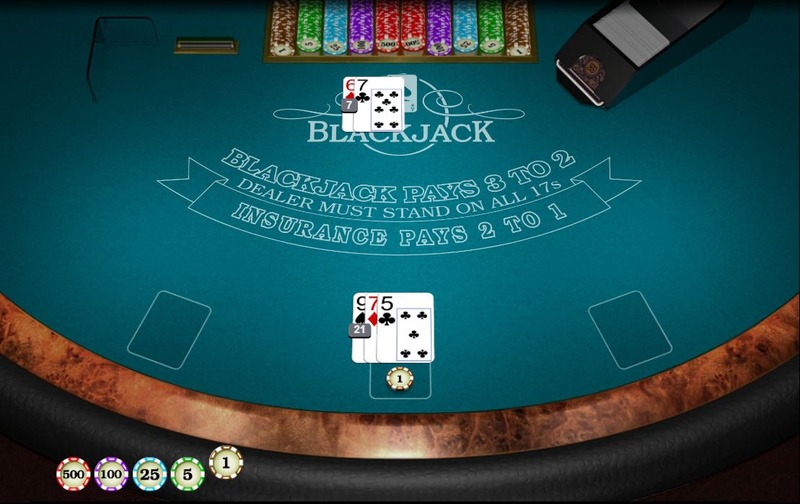
Our luck was in. We get a 5 to make 21 on the button, and the dealer’s up card was a 6 giving them 13. They had to keep drawing cards to 16 and their third card was another 7 giving them a total of 20, meaning we won the hand.
We are paid out at 1:1, so our stake of £1 becomes £2.
If you are wondering why we were not paid out at the blackjack rate of 3:2, it’s because 21 is not the same as blackjack. Blackjack refers to hands made up of an Ace (worth 1 or 11) and a card worth 10, so the higher payout refers only to this card combination. True blackjack will also usually beat a hand of 21 even though they have the same numerical value.
Splitting
You may on occasion be dealt two cards with the same face value, like this:
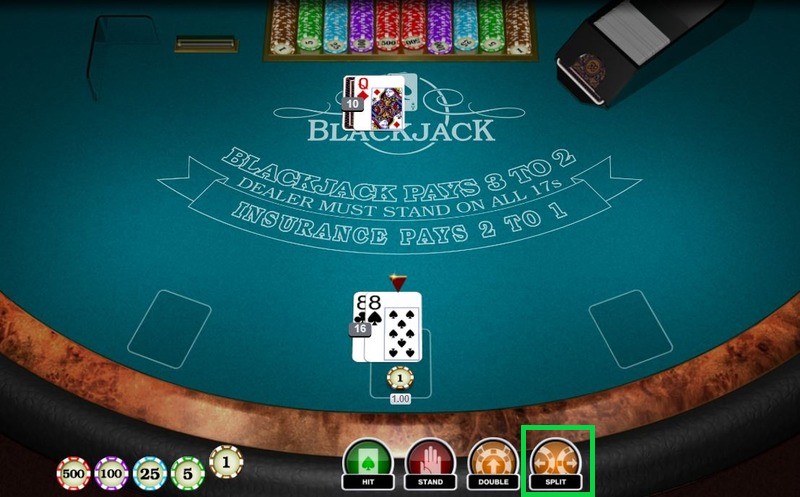
If this happens you will be given the option to ‘split’, highlighted in green above, and if you choose that option the two cards will be separated to create two different hands. It will also cost you another bet equal to the initial stake.
You are now playing two hands against the dealer’s one, but the advantage is that you know what one of their cards is before you make the decision.
Let’s split the hand above and see what it looks like:
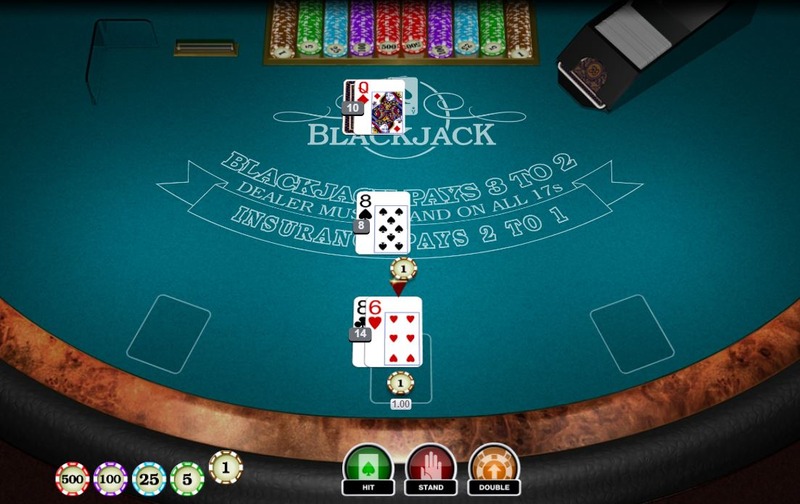
You can see the new hand has been created above the initial hand with the extra stake below it.
The game now plays out as normal one hand at a time, so you will complete the hand at the bottom before moving on to the one above.
Assuming you haven’t gone bust on both hands, the dealer will then complete their hand and any winnings will be paid out.
It is possible to lose both hands, win both hands, and to win one but lose the other.
Doubling Down
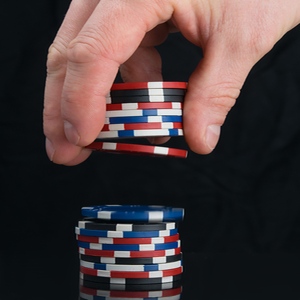 This is not the same as the option to double your bet before the game begins.
This is not the same as the option to double your bet before the game begins.
Doubling down is another mid game option in blackjack, but it’s only possible after the first two cards are dealt. If you do it you can only receive one more card and it is obviously costing you twice your original stake too, so it is a risk.
There are times when doubling down makes statistical sense, although you should only ever do it when the dealer is showing a low value up card:
- When your hand totals 11
- When you have a soft 16, 17, or 18
- When you have a hard 9 or 10
A soft hand is one that contains an Ace, a hard hand is one that does not. Therefore, a soft 18 can still trigger the option to double (table rules allowing) because your hand would be an Ace and a 7, which could also make 8 should the Ace be used as a 1 rather than an 11.
You should never double down if the dealer is showing an Ace.
Insurance
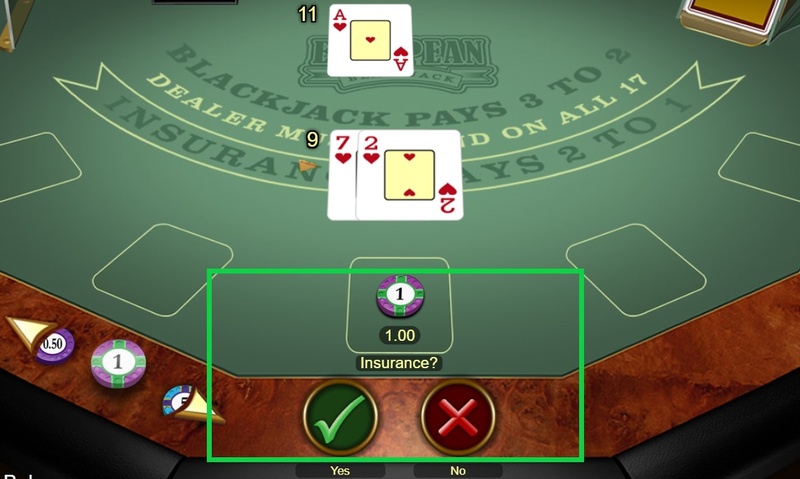
It is widely accepted that you should never take insurance when playing blackjack.
It will be offered to you if the dealer’s up card is an Ace as in the image above, which is obviously a dangerous card for them to have because if their down card is a 10 they will get blackjack and beat any hand you can come up with.
This is what you are insuring yourself against.
The problem is that insurance costs half of your original stake and only pays out at 2/1 if the dealer does have blackjack. So in a best case scenario you lose your stake but win your insurance bet, the result being that you come away even.
If the dealer does not have blackjack you lose your insurance bet and you might lose the hand as well, costing you half as much again overall.
If you win the hand, your overall winnings are half what they would be because you lost your insurance bet.
None of these three options are great for the player, so best to just complete the hand as normal and carry on.
Perfect Blackjack Strategy
Each version of the game has a perfect or optimal strategy to go along with it. This can be thought of as an instruction manual that tells you exactly what to do in any given scenario, and it ensures that you give the casino as low a house edge as possible.
Of course the game is still weighted in their favour even if you do everything 100% correctly, but by sticking to your strategy you at least aren’t giving them any more of an advantage.
Below are the optimal strategies for a single deck, 6 deck, and 8 deck game of blackjack. They should hopefully be pretty easy to understand, and they tell you what to do with every card combination on the table.
So if you have a 9 and a 6 and the dealer has a 10, you can look at the charts and find out whether it is better to hold, hit, double, etc.
This doesn’t mean you will win the hand every time, but over the long term these are the best moves to make.
Single Deck Blackjack Strategy
This table assumes that the dealer holds on a soft 17.
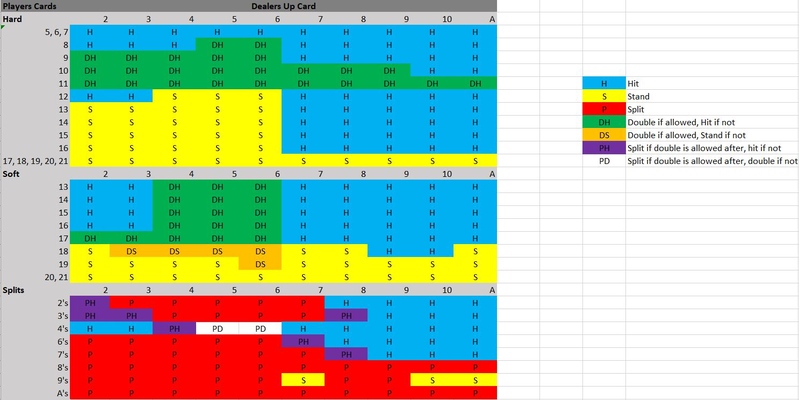
6 to 8 Deck Blackjack Strategy
Likewise, this table also assumes that the dealer holds on a soft 17.
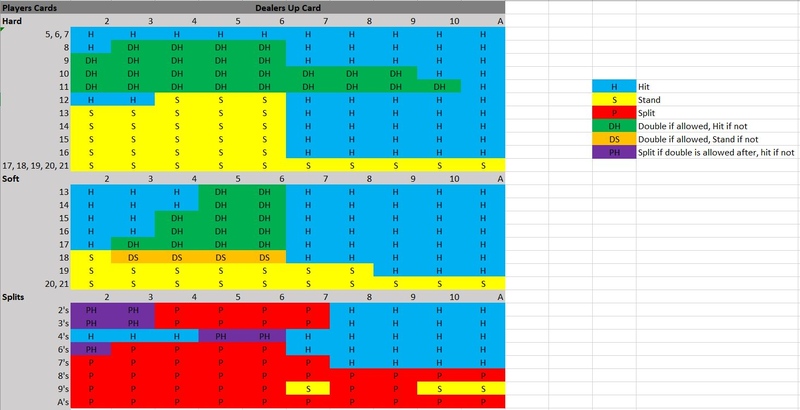
Variations and Rule Changes
We mentioned that the game of blackjack has been tinkered with a lot over the years, and there are now more variations of the game than ever.
Some of these have just had the rules changed a little, while others introduce new betting options or game play options to either give the player more control or a chance to win larger amounts of money on each hand – with increased risk of course.
We will cover a few specific side bets in detail in the section below, but apart from them, there are two main ways in which developers alter the game.
Number of Decks
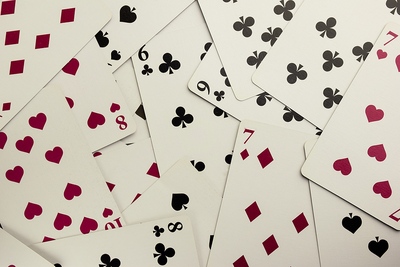 One way they do this is by altering the number of decks used in the game. You will find anywhere from a single deck to eight decks being used in most games, although six or eight is most common.
One way they do this is by altering the number of decks used in the game. You will find anywhere from a single deck to eight decks being used in most games, although six or eight is most common.
Single deck blackjack would be the ideal choice for anyone who wants to count cards because they can easily calculate their chances of success based on the cards they can see and the cards remaining in the shoe.
This is actually why extra decks were added by casinos in the first place, to make card counting more difficult, but single deck games do exist. You might find the blackjack payout has been reduced to 6:5 though in an attempt to balance things out.
The optimal strategy is slightly different depending on the number of decks used too, so if you are following a strategy make sure it suits the game you are actually playing.
Additional Features
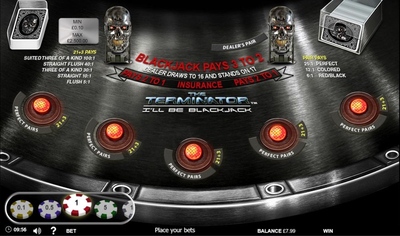 Some blackjack variations use additional features to mix things up, such as Blackjack Surrender which allows players to bail on a hand if they don’t like it and get half of their stake back.
Some blackjack variations use additional features to mix things up, such as Blackjack Surrender which allows players to bail on a hand if they don’t like it and get half of their stake back.
Other games might give you something for free, like Free Chip Blackjack which doesn’t charge for doubling or splitting in certain situations.
These options add a different dimension to the game but again, they have to be balanced so the game is weighted properly. It might be that the rules have been adapted so that the dealer checks for blackjack before the player takes their turn, or that doubling after splitting is not allowed. Whatever it is, you will usually find that you are paying for these extra features in one way or another.
Other variations might be themed around a popular movie or TV show, such as Terminator Blackjack which, although it features side bets, is essentially just blackjack with some visual differences; or Deal or No Deal Blackjack, which takes elements of the popular game show and incorporates them in to the game, in this case by allowing players to ‘sell’ their hand to the dealer or see the hand through.
You might even find a progressive jackpot built into some variations.
As you can tell, the developers can be very inventive with their creations, but it is up to you to decide whether or not you think these additional features are any good.
Side Bets
Side bets are a more traditional addition to blackjack than some of the extra features mentioned above, but there are a good number of different ones available.
You will usually find them next to where you place your regular bets and they sometimes change appearance when active. The image below is from a game called All Bets Blackjack which has loads of them, so they are encircling the main betting area and we have marked them with red stars:
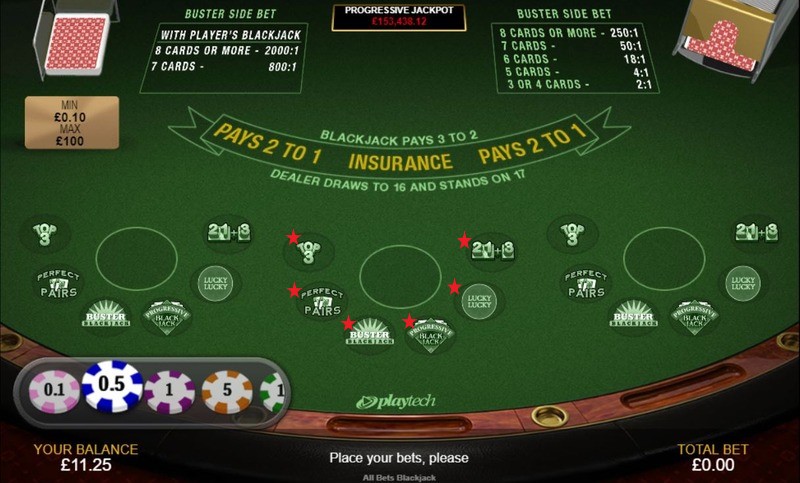
A side bet is just an extra bet that can be played alongside the main game, and not all games will include them while others might include four or five different side bets.
There is no obligation to use them either, they are completely optional.
A side bet is independent of the main game in the sense that you can lose the game but still win the side bet, although they are all based on what happens within the game.
For example, one popular side bet is that the dealer will go bust. If the player goes bust the dealer wouldn’t usually reveal their hand because it is irrelevant, but with this side bet active the game would continue even though the player’s hand had lost, because the side bet depends on the dealer’s hand.
Here are some of the most regularly spotted side bets and a brief description:
| Side Bet | Description |
|---|---|
| Perfect Pairs | A bet that you will be dealt any pair. |
| Buster | A bet on the dealer going bust. Sometimes the payout can increase the more cards it takes them to do so. |
| 21+3 | Pays if specific hands are formed using the player’s first 2 cards & the dealer’s up card. |
| Hi-Lo | Bet on whether the player’s second card will be higher or lower than the first. |
| 7’s | Hands containing 7’s win, sometimes the dealer’s up card is also included to allow for a triple 7 payout. |
| Lucky Lucky | Create specific combinations using the dealer’s up card and the player’s first two cards. |
Rather confusingly these side bets can also have different names, for example the Buster side bet is sometimes called Bust It, and the rules for them can change too, but essentially these are the man ‘types’ of side bet out there.
You might sometimes find a jackpot side bet too, which is just an opportunity to win an associated jackpot. Some are triggered randomly on any hand and others require a specific bet to be in with a chance.
Common Questions
